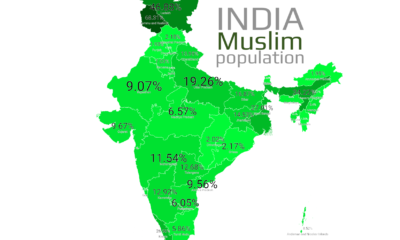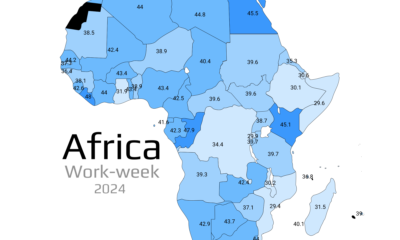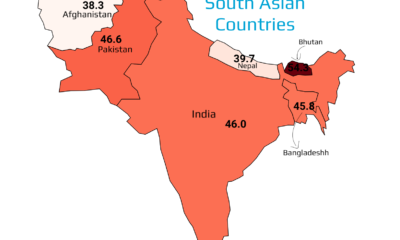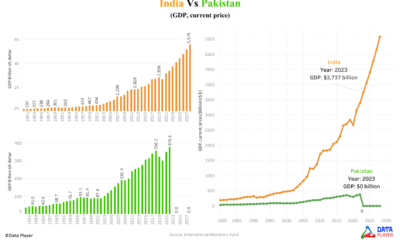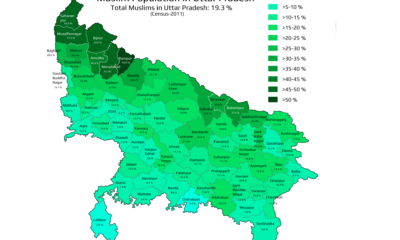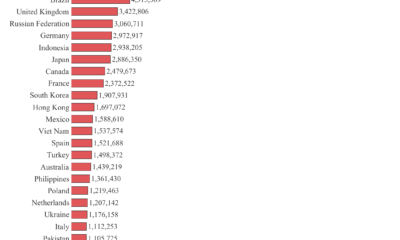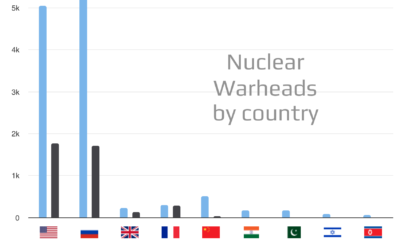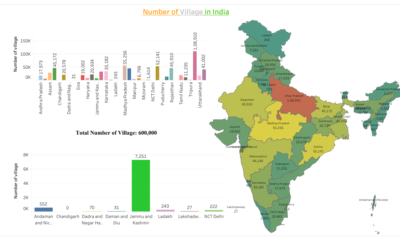Demographics
Mapped: Average Working Hours by European Countries in 2024
Published
7 months agoon
Click or Hover at the specific region on the map to get details of corresponding region.
| Category | Average WorkWeek Hours |
|---|---|
| Total | |
| Male | |
| Female |
In Europe, how long people work each week can vary a lot. Each country has its own average hours that people work. This depends on their rules, culture, and how their economy works now. Some countries have shorter workweeks, like Netherlands with 26.7 hours, while others, like Bosnia and Herzegovina, have longer ones at 40.9 hours. These differences show how each place balances getting work done with letting people have time for their lives outside of work. It’s interesting to see how these factors shape work hours across Europe today.
Germany: With an average of 29.7 hours per week, Germany emphasizes a strong work-life balance supported by efficient work practices and comprehensive social welfare systems. This approach fosters high productivity while ensuring ample leisure time for personal pursuits and family life.
United Kingdom: The UK averages 30.7 hours per week, with sectors like finance and law often requiring longer hours. However, there’s a growing emphasis on flexible working arrangements and well-being initiatives to maintain productivity and employee satisfaction.
France: French workers also average 30.7 hours per week, benefitting from labor laws that prioritize leisure time and personal fulfillment alongside professional commitments. This balanced approach supports a high quality of life and cultural appreciation for relaxation.
Italy: Italians work approximately 34.0 hours per week, blending economic productivity with a lifestyle that values family and social connections. Work-life integration is common, allowing for flexibility in managing work responsibilities and personal life.
Spain: Spain averages 32.1 hours per week, reflecting a Mediterranean culture that values work alongside socializing and relaxation. This balance promotes a healthy work-life equilibrium, contributing to overall happiness and well-being.
Poland: With 36.7 hours per week, Poland demonstrates a strong work ethic influenced by historical experiences and economic aspirations. Long hours are viewed as essential for career advancement and maintaining economic stability.
| Country | Avg hour per week | Male | Female |
|---|
Ukraine: Ukrainians work an average of 38.5 hours per week, driven by economic challenges and competitive job market conditions. Despite this, there’s a determination to succeed professionally, often leading to extended work hours and dedication to career goals.
Romania: Romanians average 38.9 hours per week, emphasizing hard work as a means to achieve financial security and career success. This dedication is rooted in cultural values that prioritize professional achievement and economic stability.
Netherlands: Dutch workers enjoy a shorter average work week of 26.7 hours, supported by progressive social policies and efficient work practices. This approach not only enhances work-life balance but also contributes to high levels of job satisfaction and well-being.
Belgium: Belgians work about 31.5 hours per week, maintaining a balance between productivity and leisure time. Strong labor laws and social welfare policies support a high quality of life and employee satisfaction.
Sweden: Swedes work an average of 29.2 hours per week, emphasizing gender equality and work-life balance. Flexible work hours and family-friendly policies contribute to a positive work environment and societal well-being.
Czech Republic: In the Czech Republic, people work about 35.2 hours per week, influenced by a strong industrial base and historical work ethic. Modern economic practices blend with traditional values, shaping work culture and expectations.
Greece: Greeks work an average of 37.8 hours per week, valuing dedication and hard work amidst economic challenges. Long hours are seen as a path to economic stability and personal fulfillment.
Portugal: Portuguese workers average 33.8 hours per week, balancing work with a relaxed lifestyle. Cultural values and economic conditions shape work habits, promoting both productivity and well-being.
Hungary: Hungarians work about 36.2 hours per week, driven by a commitment to economic growth and professional success. Family-oriented values complement hard work, influencing work-life balance.
Belarus: Belarusians work an average of 35.6 hours per week, reflecting a strong work ethic and economic priorities. Long hours are common in pursuit of career advancement and financial security.
Austria: Austrians work about 29.4 hours per week, enjoying a high quality of life supported by strong labor laws and social policies. This balance promotes productivity and personal well-being.
Switzerland: Swiss workers average 34.1 hours per week, emphasizing work-life balance and leisure time. A competitive economy and robust social welfare systems contribute to a positive work environment.
Serbia: Serbians work an average of 39.6 hours per week, driven by a strong work ethic and economic stability goals. Long hours are typical across various sectors, reflecting dedication to career advancement.
Bulgaria: In Bulgaria, people work about 38.2 hours per week, combining hard work with family and community values. Economic development and professional achievement are key priorities.
Denmark: Danes work about 29.5 hours per week, focusing on work-life balance and gender equality. Progressive social policies and a high standard of living contribute to a positive work environment.
Slovakia: Slovaks work an average of 33.7 hours per week, balancing traditional work ethic with modern economic practices. Efforts towards economic reform shape work habits and expectations.
Finland: Finns work about 28.9 hours per week, prioritizing work-life balance and social equality. Policies promoting well-being and economic competitiveness support a positive work environment.
Norway: Norwegians work an average of 27.1 hours per week, emphasizing quality of life and leisure time. Strong social welfare policies and a prosperous economy contribute to a healthy work-life balance.
Ireland: Irish workers average 31.0 hours per week, blending productivity with a commitment to work-life balance. This balance supports economic growth while prioritizing employee well-being.
Croatia: Croatians work about 34.4 hours per week, balancing economic development with cultural values. A moderate work week contributes to a high quality of life and societal well-being.
Moldova: People in Moldova work about 38.3 hours per week, driven by economic conditions and career aspirations. Long hours are viewed as essential for personal and professional success.
Bosnia and Herzegovina: Bosnians work an average of 40.9 hours per week, reflecting a strong work ethic and economic priorities. Long hours are common in pursuit of stability and career growth.
Albania: Albanians work about 40.8 hours per week, valuing dedication and hard work amidst economic challenges. Long hours are seen as crucial for achieving economic stability and personal success.
Lithuania: Lithuanians work an average of 34.7 hours per week, focusing on economic growth and personal fulfillment. Cultural values promote a balance between work, family, and leisure time.
Slovenia: Slovenians work about 34.6 hours per week, driven by a strong work ethic and economic aspirations. Long hours contribute to career advancement and personal fulfillment.
North Macedonia: North Macedonians work an average of 37.6 hours per week, blending traditional work ethic with modern economic practices. Reforms aim to enhance economic integration and work-life balance.
Latvia: Latvians work about 33.2 hours per week, prioritizing economic development and personal well-being. Cultural values influence work habits, promoting a balanced approach to work and life.
Estonia: People in Estonia work about 32.0 hours per week, focusing on work-life balance and gender equality. Progressive policies support a positive work environment and societal well-being.
Luxembourg: Luxembourgers work about 30.7 hours per week, balancing productivity with a commitment to work-life balance. Strong social policies contribute to a high quality of life and economic stability.
Montenegro: Montenegrins work an average of 42.7 hours per week, driven by economic ambitions and career goals. Long hours are common in pursuit of personal and professional success.
Malta: People in Malta work about 33.8 hours per week, emphasizing a balance between work and leisure. Economic conditions and cultural values shape work habits, promoting well-being and productivity.
Iceland: Icelanders work an average of 32.9 hours per week, focusing on quality of life and leisure time. Progressive social policies and a strong economy support a healthy work-life balance.
Information about this Article
Copyright: © 2024 Data Player
*Note: Hover or click on country’s region to get full details. A box with details will appear a little bit down the map.
Data source: worldpopulationreview
This webpage provides information on Avg. Working Hours per week in European Countries and uses various technologies for its functionality.
The following tools and technologies were used:
- HTML and CSS for the webpage structure and styling
- JavaScript for interactive features
- External data sources for statistics
You may like


The Rise of Asian Ethnic groups in 21st Century in the United Kingdom


Who is running in the 2024 U.S. presidential election?


Mapped: What is Muslim Population in India by its State | Census 2011


Mapped: Average Working Hours weekly by African Countries in 2024


Mapped: Average Working Hours weekly by South Asian Countries in 2024
Religious Demographics of London by Area | Constituency 2021
Demographics
Mapped: Average Working Hours weekly by African Countries in 2024
Published
7 months agoon
July 20, 2024Total Hours:
Female Hours:
Male Hours:
In Africa, the average working hours per week across countries are influenced by various economic, social, and cultural factors, along with differences in gender roles and labor practices.
In Nigeria, the most populous country in Africa rich in oil and diverse ethnic groups, the average workweek is 43.4 hours per week. Men work about 43.7 hours per week, while women work around 42.9 hours per week. This balance reflects the country's economic activities and labor distribution.
In Ethiopia, known for its ancient history and coffee, the average workweek is 30.1 hours per week. Men work around 32.7 hours per week, while women work about 27.2 hours per week, showing a significant difference likely influenced by traditional gender roles and economic structures.
Egypt, home to ancient civilizations and the pyramids, sees an average workweek of 45.5 hours per week. Men work about 46.8 hours per week, whereas women work around 39.4 hours per week, reflecting the economic pressures and societal expectations in northeastern Africa.
In the Democratic Republic of Congo, rich in natural resources and located in central Africa, the average workweek is 34.4 hours per week. Men work about 35.5 hours per week, while women work around 33.4 hours per week, reflecting a modest difference in gender work distribution.
Tanzania, known for Serengeti National Park and Mount Kilimanjaro, has an average workweek of 39.7 hours per week. Men work around 43.3 hours per week, and women work about 35.9 hours per week, showing a gender gap influenced by cultural and economic factors.
In South Africa, located at the southern tip of the continent, the average workweek is 41.7 hours per week. Men work about 43.8 hours per week, while women work around 39.1 hours per week, reflecting the country’s diverse economy and labor practices.
Kenya, famous for its safaris and national parks, has an average workweek of 45.1 hours per week. Men work around 47.9 hours per week, while women work about 42.2 hours per week, highlighting the demanding nature of work in East Africa.
Africa Average Workweek Data
| Country | Avg hour per week (AHW) | Male (AHW) | Female (AHW) |
|---|---|---|---|
| Nigeria | 43.4 | 43.7 | 42.9 |
| Ethiopia | 30.1 | 32.7 | 27.2 |
| Egypt | 45.5 | 46.8 | 39.4 |
| DR Congo | 34.4 | 35.5 | 33.4 |
| Tanzania | 39.7 | 43.3 | 35.9 |
| South Africa | 41.7 | 43.8 | 39.1 |
| Kenya | 45.1 | 47.9 | 42.2 |
| Uganda | 38.7 | 39.8 | 37.5 |
| Sudan | 39.6 | 41.8 | 33 |
| Algeria | 44 | 45.6 | 36 |
| Morocco | 43.9 | 46.6 | 34.4 |
| Angola | 39.3 | 41.2 | 37.4 |
| Ghana | 31.9 | 33.8 | 29.8 |
| Mozambique | 29.4 | 33.6 | 25.4 |
| Madagascar | 31.5 | 33.5 | 29.4 |
| Côte d'Ivoire | 44 | 46.3 | 41 |
| Cameroon | 42.5 | 44.6 | 40.1 |
| Niger | 38.9 | 42.8 | 33.4 |
| Mali | 42.4 | 46.4 | 36 |
| Burkina Faso | 43.4 | 46.4 | 39.8 |
| Malawi | 30.2 | 33.6 | 26.5 |
| Zambia | 42.4 | 44.5 | 39.8 |
| Chad | 40.4 | 42 | 38.2 |
| Somalia | 29.6 | 30.5 | 27.4 |
| Senegal | 44.2 | 48.3 | 37.7 |
| Zimbabwe | 37.1 | 40.5 | 33.6 |
| Guinea | 38.1 | 40.2 | 34.9 |
| Rwanda | 29.9 | 31.9 | 27.6 |
| Benin | 38.9 | 41.4 | 36 |
| Burundi | 39.7 | 41 | 38.4 |
| Tunisia | 43.6 | 44.4 | 41.2 |
| South Sudan | 40.1 | 43.7 | 36.5 |
| Togo | 43.4 | 45.1 | 41.5 |
| Sierra Leone | 42.6 | 44.8 | 40.3 |
| Libya | 44.8 | 46.9 | 40.7 |
| Congo | 47.9 | 48.3 | 47.5 |
| Central African Republic | 39.6 | 42 | 36.7 |
| Liberia | 48 | 49.6 | 46.2 |
| Mauritania | 38.5 | 38.9 | 37.5 |
| Eritrea | 35.3 | 37.7 | 32.5 |
| Gambia | 37.7 | 43.9 | 30.9 |
| Botswana | 43.7 | 46 | 41 |
| Namibia | 42.9 | 44.9 | 40.9 |
| Gabon | 42.3 | 44 | 39.1 |
| Lesotho | 49.5 | 51 | 47.6 |
| Guinea-Bissau | 36.4 | 39 | 33.1 |
| Equatorial Guinea | 41.6 | 43.7 | 38.7 |
| Mauritius | 39.5 | 40.5 | 37.9 |
| Eswatini | 44 | 46.8 | 40.7 |
| Djibouti | 30.6 | 31.7 | 27.5 |
| Comoros | 36.8 | 38.2 | 34.3 |
| Cabo Verde | 42.9 | 44.1 | 41.5 |
| Sao Tome & Principe | 41.4 | 44 | 35.9 |
| Seychelles |
AHW is an abbreviation for Average Hour per Week.
In Uganda, known for its diverse wildlife and Lake Victoria, the average workweek is 38.7 hours per week. Men work around 39.8 hours per week, and women work about 37.5 hours per week, showing relatively balanced gender participation in the workforce.
Sudan, a northeastern African country with a rich history, has an average workweek of 39.6 hours per week. Men work about 41.8 hours per week, while women work around 33 hours per week, reflecting significant gender differences in work hours.
Algeria, the largest country in Africa by land area, has an average workweek of 44 hours per week. Men work about 45.6 hours per week, whereas women work around 36 hours per week, showing a notable gender disparity influenced by cultural norms.
In Morocco, known for its rich cultural heritage and historic cities, the average workweek is 43.9 hours per week. Men work around 46.6 hours per week, while women work about 34.4 hours per week, highlighting significant gender differences in work hours.
Angola, located in southern Africa and rich in natural resources like oil and diamonds, has an average workweek of 39.3 hours per week. Men work around 41.2 hours per week, while women work about 37.4 hours per week.
In Ghana, known for its gold resources and vibrant culture, the average workweek is 31.9 hours per week. Men work about 33.8 hours per week, and women work around 29.8 hours per week, showing a smaller gender gap compared to other countries.
Mozambique, with its beautiful coastline and marine life, has an average workweek of 29.4 hours per week. Men work around 33.6 hours per week, while women work about 25.4 hours per week, showing one of the larger gender gaps in working hours.
In Madagascar, known for its unique biodiversity, the average workweek is 31.5 hours per week. Men work about 33.5 hours per week, while women work around 29.4 hours per week, showing a moderate gender difference.
Côte d'Ivoire, a West African country known for cocoa production, has an average workweek of 44 hours per week. Men work about 46.3 hours per week, whereas women work around 41 hours per week, reflecting high work demands in agriculture and trade.
In Cameroon, with diverse landscapes and cultural heritage, the average workweek is 42.5 hours per week. Men work around 44.6 hours per week, while women work about 40.1 hours per week.
Niger, known for its desert landscapes and rich cultural traditions, has an average workweek of 38.9 hours per week. Men work around 42.8 hours per week, while women work about 33.4 hours per week, reflecting traditional gender roles.
In Mali, known for its music and historical sites, the average workweek is 42.4 hours per week. Men work around 46.4 hours per week, whereas women work about 36 hours per week, indicating significant gender differences.
Burkina Faso, known for its vibrant arts scene and cultural festivals, has an average workweek of 43.4 hours per week. Men work around 46.4 hours per week, while women work about 39.8 hours per week, highlighting the gender gap.
In Malawi, known for its lake and friendly people, the average workweek is 30.2 hours per week. Men work around 33.6 hours per week, while women work about 26.5 hours per week, showing a large gender difference in work hours.
Zambia, known for its natural beauty and Victoria Falls, has an average workweek of 42.4 hours per week. Men work around 44.5 hours per week, while women work about 39.8 hours per week.
In Chad, known for its desert landscapes, the average workweek is 40.4 hours per week. Men work about 42 hours per week, whereas women work around 38.2 hours per week.
Somalia, located in the Horn of Africa, has an average workweek of 29.6 hours per week. Men work around 30.5 hours per week, while women work about 27.4 hours per week, reflecting economic challenges and traditional roles.
In Senegal, known for its music and vibrant cultural festivals, the average workweek is 44.2 hours per week. Men work around 48.3 hours per week, while women work about 37.7 hours per week, highlighting significant gender differences.
Zimbabwe, known for Victoria Falls and diverse wildlife, has an average workweek of 37.1 hours per week. Men work around 40.5 hours per week, while women work about 33.6 hours per week.
In Guinea, known for its natural resources and musical heritage, the average workweek is 38.1 hours per week. Men work around 40.2 hours per week, while women work about 34.9 hours per week.
Rwanda, known for its mountainous landscape and wildlife, has an average workweek of 29.9 hours per week. Men work around 31.9 hours per week, while women work about 27.6 hours per week, reflecting balanced gender participation.
In Benin, known for its rich history and cultural heritage, the average workweek is 38.9 hours per week. Men work around 41.4 hours per week, while women work about 36 hours per week.
Burundi, known for its hills and tea plantations, has an average workweek of 39.7 hours per week. Men work around 41 hours per week, while women work about 38.4 hours per week.
In Tunisia, known for its Mediterranean coastline and ancient ruins, the average workweek is 43.6 hours per week. Men work around 44.4 hours per week, while women work about 41.2 hours per week.
South Sudan, the youngest country in the world, has an average workweek of 40.1 hours per week. Men work around 43.7 hours per week, while women work about 36.5 hours per week.
In Togo, known for its palm-lined beaches and hilltop villages, the average workweek is 43.4 hours per week. Men work around 45.1 hours per week, while women work about 41.5 hours per week.
Sierra Leone, known for its tropical rainforest and coastline, has an average workweek of 42.6 hours per week. Men work around 44.8 hours per week, while women work about 40.3 hours per week.
In Libya, with its vast deserts and rich history, the average workweek is 44.8 hours per week. Men work around 46.9 hours per week, while women work about 40.7 hours per week.
Congo, known for its rainforests and diverse wildlife, has an average workweek of 47.9 hours per week. Men work around 48.3 hours per week, while women work about 47.5 hours per week, reflecting high labor demands.
In the Central African Republic, known for its diverse wildlife and cultures, the average workweek is 39.6 hours per week. Men work around 42 hours per week, while women work about 36.7 hours per week.
Liberia, known for its history and beautiful coastline, has an average workweek of 48 hours per week. Men work around 49.6 hours per week, while women work about 46.2 hours per week.
Mauritania, with its vast deserts and rich cultural traditions, has an average workweek of 38.5 hours per week. Men work around 38.9 hours per week, while women work about 37.5 hours per week.
In Eritrea, known for its Red Sea coastline and history, the average workweek is 35.3 hours per week. Men work around 37.7 hours per week, while women work about 32.5 hours per week.
Gambia, known for its river and cultural heritage, has an average workweek of 37.7 hours per week. Men work around 43.9 hours per week, while women work about 30.9 hours per week.
In Botswana, known for its wildlife and Okavango Delta, the average workweek is 43.7 hours per week. Men work around 46 hours per week, while women work about 41 hours per week.
Namibia, known for its Namib Desert and diverse wildlife, has an average workweek of 42.9 hours per week. Men work around 44.9 hours per week, while women work about 40.9 hours per week.
In Gabon, with its rich biodiversity and oil resources, the average workweek is 42.3 hours per week. Men work around 44 hours per week, while women work about 39.1 hours per week.
Lesotho, known for its high altitude and mountainous terrain, has the highest average workweek of 49.5 hours per week. Men work around 51 hours per week, while women work about 47.6 hours per week.
In Guinea-Bissau, known for its national parks and diverse wildlife, the average workweek is 36.4 hours per week. Men work around 39 hours per week, while women work about 33.1 hours per week.
Equatorial Guinea, with significant oil reserves and a unique cultural heritage, has an average workweek of 41.6 hours per week. Men work around 43.7 hours per week, while women work about 38.7 hours per week.
In Mauritius, known for its beaches and diverse cultures, the average workweek is 39.5 hours per week. Men work around 40.5 hours per week, while women work about 37.9 hours per week.
Eswatini, known for its nature reserves and culture, has an average workweek of 44 hours per week. Men work around 46.8 hours per week, while women work about 40.7 hours per week.
Djibouti, known for its strategic location and port, has an average workweek of 30.6 hours per week. Men work around 31.7 hours per week, while women work about 27.5 hours per week.
In Comoros, known for its volcanic islands and culture, the average workweek is 36.8 hours per week. Men work around 38.2 hours per week, while women work about 34.3 hours per week.
Cabo Verde, known for its Creole culture, has an average workweek of 42.9 hours per week. Men work around 44.1 hours per week, while women work about 41.5 hours per week.
In São Tomé and Príncipe, known for its biodiversity and coffee, the average workweek is 41.4 hours per week. Men work around 44 hours per week, while women work about 35.9 hours per week.
Lastly, Seychelles, known for its beaches and marine life, does not have available data for average work hours per week, reflecting its unique economic and labor conditions.
Overall, these differences in average work hours per week across African countries are shaped by a blend of economic demands, cultural norms, and gender roles, with significant variations between men and women’s work hours highlighting the impact of traditional and economic factors.
Information
Copyright: © 2024 Data Player
*Note: Hover or click on country's region to get full details. A box with details will appear a little bit down the map.
Data source: worldpopulationreview
This webpage provides information on Avg. Working Hours per Week in South Asian Countries and uses various technologies for its functionality.
The following tools and technologies were used:
* HTML and CSS for the webpage structure and styling
* JavaScript for interactive features
* External data sources for statistics
Demographics
Mapped: Average Working Hours weekly by South Asian Countries in 2024
Published
7 months agoon
July 19, 2024Country
In South Asia, the average number of hours people work each week varies greatly due to a combination of economic conditions, cultural norms, labor laws, and gender roles.
In India, the average workweek is 46 hours. The economy is diverse, with a significant portion of the workforce in the informal sector, leading to longer working hours. Men work about 49.9 hours per week, while women work around 36 hours. Traditional views that men are the primary breadwinners mean men often work longer hours, while women balance household responsibilities with their jobs, resulting in shorter official working hours but significant unpaid labor at home.
In Pakistan, the average workweek is 46.6 hours. Similar to India, a large informal sector results in longer working hours. Men work about 50.3 hours per week, whereas women work around 34.2 hours due to domestic responsibilities and societal norms limiting their workforce participation.
In Bangladesh, the average workweek is 45.8 hours. The growing economy, especially in the garment industry, necessitates long hours. Men work about 49.9 hours per week, and women work around 36.9 hours, balancing work with household duties, leading to shorter official working hours.
In Nepal, the average workweek is 39.7 hours. The mixed economy, with a significant agricultural component, results in varied working hours. Men work around 42.6 hours per week, while women work about 34.7 hours, often engaging in considerable unpaid work at home.
South Asia Average Workweek Data
| Country | Avg hour per week (AHW) | Male (AHW) | Female (AHW) |
|---|---|---|---|
| India | 46 | 49.9 | 36 |
| Pakistan | 46.6 | 50.3 | 34.2 |
| Bangladesh | 45.8 | 49.9 | 36.9 |
| Nepal | 39.7 | 42.6 | 34.7 |
| Bhutan | 54.3 | 55 | 53.5 |
| Maldives | 45.2 | 48.9 | 35.8 |
| Afghanistan | 38.3 | 39.6 | 15.8 |
| Sri Lanka | 41.2 | 43.6 | 36.2 |
AHW is an abbreviation for Average Hour per Week.
Bhutan stands out with the highest average workweek of 54.3 hours, reflecting greater gender equality and cultural acceptance of long work hours. Men work about 55 hours per week, and women work around 53.5 hours.
In the Maldives, the average workweek is 45.2 hours. The tourism-driven economy with seasonal fluctuations affects working hours, with men working about 48.9 hours per week during peak seasons. Women work around 35.8 hours due to traditional roles and domestic responsibilities.
In Afghanistan, the average workweek is 38.3 hours. The war-torn economy and many people engaged in informal work see men working about 39.6 hours per week. Strict cultural norms heavily restrict women’s participation in the workforce, resulting in very low working hours for women, around 15.8 hours.
In Sri Lanka, the average workweek is 41.2 hours. The diverse economy leads to varying working hours across different sectors. Men work about 43.6 hours per week, while women work around 36.2 hours, performing a significant amount of unpaid domestic work.
Overall, in South Asian countries, economic conditions, the prevalence of informal sectors, cultural expectations, and the enforcement of labor laws play crucial roles in determining working hours. Traditional gender roles typically see men working longer hours outside the home, while women balance official work with substantial unpaid labor at home, leading to notable gender disparities in workforce participation.
Information
Copyright: © 2024 Data Player
*Note: Hover or click on country’s region to get full details. A box with details will appear a little bit down the map.
Data source: worldpopulationreview
This webpage provides information on Avg. Working Hours per Week in South Asian Countries and uses various technologies for its functionality.
The following tools and technologies were used:
* HTML and CSS for the webpage structure and styling
* JavaScript for interactive features
* External data sources for statistics
Demographics
Religious Demographics of North West England by Constituency Area 2021
Published
7 months agoon
July 9, 2024| Constituency | Data |
|---|
Copyright: © 2024 Data Player
*Note Hover or click on constituency name to get full view, A tooltip box will appear little bit down.
Data source: ONS Religion 2021 Census, House of Commons Library
This bar chart shows the population of different religions in the constituency of North West England.
The following tools and technologies were used:
- HTML and CSS for the webpage structure and styling
- JavaScript for fetching and processing data
Trending

 Economy2 years ago
Economy2 years agoWhy Pakistan’s economy is drowning while India’s economy is touching the sky

 Religion7 months ago
Religion7 months agoMapped: What are the muslims population in Uttar Pradesh | State of India

 Technology1 year ago
Technology1 year agoHighest number of software developers by country in the world 2023 by GitHub | Data Player

 Superpower countries6 months ago
Superpower countries6 months agoGlobal Nuclear Warhead Distribution by Nation 2024

 Demographics2 years ago
Demographics2 years agoWhat are the Number of Villages in India by its State and Union Territory

 Demographics2 years ago
Demographics2 years agoMassive population size by Indian states 2023
- Demographics2 years ago
Ranked: Highest Populated Countries (2023)

 Population4 months ago
Population4 months agoThe Rise of Asian Ethnic groups in 21st Century in the United Kingdom





